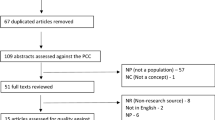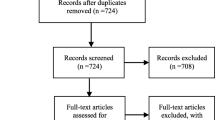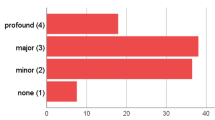Abstract
Creative arts have been increasingly implemented in medical education. This study investigated the use of interactive theater and role play with professional actors in teaching breaking bad news to medical students. The objectives were to explore the contexts, approaches, experiences, and reactions in giving and receiving bad news. Second-year medical students participated in a required educational session that utilized interactive theater which helps students learn about the issues of breaking bad news to a patient with cancer. Following the interactive theater piece, professional actors provided students role play experiences in small groups with breaking bad news. Anonymous evaluation surveys were given out to all second-year medical students at the conclusion of the breaking bad news session. Surveys contained quantitative and qualitative responses. Three years of evaluations were analyzed. A total of 451 (88 %) students completed the evaluations. Comments were thematically analyzed. Ninety-four percent agreed that the theater piece prompted reflection on patient-provider communications, and 89 % agreed that it stimulated discussion on complex issues with breaking bad news. The two most common themes in student comments concerned the importance of realism in the theater piece, and the value of experiencing multiple perspectives. Use of professional actors during the role play exercises enhances the realism and pushed the students out of their own “comfort zones” in ways that may more closely approximate real life clinical situations. Interactive theater can be a potentially powerful tool to teach breaking bad news during medical school.
Similar content being viewed by others
References
Shapiro J, Hunt L (2003) All the world's a stage: the use of theatrical performance in medical education. Med Educ 37(10):922–927
Lorenz KA, Steckart JM, Rosenfeld KE (2004) End-of-life education using the dramatic arts: the Wit educational initiative. Acad Med 79(5):481–486
Rosenbaum ME, Kreiter C (2002) Teaching delivery of bad news using experiential sessions with standardized patients. Teach Learn Med 14(3):144–149
Kohn M (2011) Performing medicine: the role of theatre in medical education. Med Human 37(1):3–4
Kumagai AK, White CB, Ross PT, Purkiss JA, O'Neal CM, Steiger JA (2007) Use of interactive theater for faculty development in multicultural education. Med Teach 29:335–340
Tang TS, Skye EP, Steiger JA (2009) Increasing patient acceptance of medical student participation: using interactive theatre for faculty development. Teach Learn Med 21(3):195–200
Gray RE, Fitch MI, Labrecque M, Greenberg M (2003) Reactions of health professionals to a research-based theater production. J Cancer Educ 18(4):223–229
Johnson L, Ousley A, Swarz J, Bingham RJ, Erickson JB, Ellis S, Moody T (2011) The art and science of cancer education and evaluation: toward facilitating improved patient outcomes. J Cancer Educ 26(1):27–35
Back T (2013) Breaking bad news. Retreived from Ethics in Medicine, University of Washington School of Medcine http://depts.washington.edu/bioethx/topics/badnws.html
Boal A (1985) Theatre of the oppressed. Teatro del oprimido y otras po√©ticas pol√ ≠ ticas.English, vol. xiv, 197 p. Theatre Communications Group, New York
Kumagai AK (2010) Invited commentary: Forks in the road: disruption and transformation in professional development. Acad Med 85:1819–1820
Piaget J (1985) The equilibration of cognitive structures: the central problem of intellectual development. In: Terrance B, Thampy KJ (eds) Equilibration des structures cognitives. English. University of Chicago Press, Chicago
Dewey J (1910) How we think. Barnes & Noble, New York
Mezirow J (1991) Transformative dimensions of adult learning. The Jossey-Bass higher and adult education series. Jossey-Bass, San Francisco
Belling C (2006) The "bad news scene" as clinical drama part I: writing scenes. Fam Med 38(6):390–392
Kumagai AK (2012) Perspective: acts of interpretation: a philosophical approach to using creative arts in medical education. Acad Med 87(8):1138–1144
Salmon P, Young B (2011) Creativity in clinical communication: from communication skills to skilled communication. Med Educ 45(3):217–226
Levy J (1997) Theatre and Moral Education. J Aesthetic Educ 31(3):65–75
Aristotle (2009) The Nicomachean ethics. Trans. W. D. Ross, and Lesley Brown, xliiith edn. Oxford University Press, New York, 277 p
Montgomery K (2006) How doctors think: clinical judgment and the practice of medicine. Oxford University Press, New York
Pellegrino ED, Thomasma DC (1993) The virtues in medical practice. Oxford University Press, New York
Fuks A, Brawer J, Boudreau JD (2012) The foundation of physicianship. Persp Biol Med 55:114–126
Kumagai AK (2013) From competencies to human interests: ways of knowing and understanding in medical education. Acad Med
Author information
Authors and Affiliations
Corresponding author
Rights and permissions
About this article
Cite this article
Skye, E.P., Wagenschutz, H., Steiger, J.A. et al. Use of Interactive Theater and Role Play to Develop Medical Students’ Skills in Breaking Bad News. J Canc Educ 29, 704–708 (2014). https://doi.org/10.1007/s13187-014-0641-y
Published:
Issue Date:
DOI: https://doi.org/10.1007/s13187-014-0641-y




